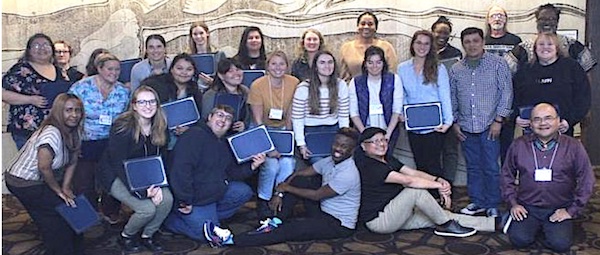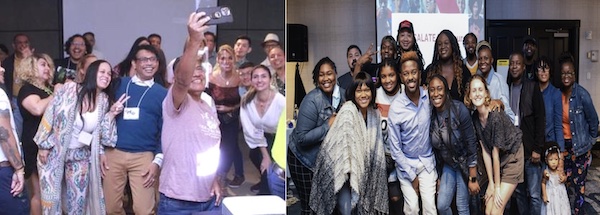
Give me a moment to brag about NMAC’s Center to End the HIV Epidemic in America and the amazing work they are doing to train the field. NMAC believes the messenger is as important as the message. Our staff come from the communities the work needs to reach. Their lived experience transforms HIV trainings into life altering moments. Too often capacity building is led by professionals who have no connection to the reality of what is means to be living with HIV. While these programs transmit information, they do not inspire or build the field. NMAC believes in community, especially in the communities hardest hit by HIV. Our work is grounded in the values and life experiences of the people we need to reach because we are a part of those communities. It’s not about reaching them; it’s about reaching us.
NMAC hired an outside evaluator, TRX Development Solutions, to do a deep review of our HRSA funded trainings. Here is the ESCALATE review: the results exceeded all expectations and documented the difference when the work comes from the communities being targeted. The full 50-page review is available upon request.
ESCALATE Alaska (Native Community)

Background
ESCALATE provides training and capacity building for organizations and programs funded by the Ryan White HIV/AIDS Program (RWHAP) to implement evidence-informed interventions and strategies to reduce HIV- related stigma. ESCALATE provides three tracks of activities for staff and community members associated with RWHAP- funded organizations in Parts A-D, including sub-recipients of Parts A and B grants: (1) training, (2) time-bound, targeted technical assistance, and (3) ESCALATE Learning Collaboratives (LCs). This summary covers the ESCALATE Training Program for Year 2 (2021-2022). https://targethiv.org/escalate
Nine ESCALATE Training Cohorts completed the training during Program Year 2 (9/1/21-8/31/22). Training served a total of 250 participants from 62 RWHAP- funded agencies in 20 states, the District of Columbia, and Puerto Rico.
Results from the second year of training show that the ESCALATE training program is a vibrant, robust, and highly successful project. Notwithstanding some notes on the time and intensity of the curriculum, the facilitators and trainers have created and delivered a curriculum that is widely accepted and appreciated by the participants. The curriculum is challenging and complex, but the results on the pre/post evaluation questions show that most participants have absorbed and gained a better understanding of the concepts involved and feel like they can implement things they learned in the training.
Approach
The ESCALATE evaluation has used the RE-AIM Framework for Implementation Science to assess the extent to which the ESCALATE Training curriculum, or tools and practices introduced in the curriculum, can be placed into practice across RWHAP communities. The framework includes five evaluation elements:
- Reach: By the end of program year two, the training established a wide reach across 22 state and federal jurisdictions and 62 RWHAP-funded agencies in Parts A, B, C, and D of the RWHAP. With 276 participants by the end of year 2, the program is on track for 1,000 or more participants by the end of the project in August 2024.
- Effectiveness: A comprehensive span of retrospective pre/post evaluation questions demonstrates the effectiveness of the training with participants, who consistently report statistically significant, high levels of learning over the course of the training.
- Adoption: Adoption of stigma reduction learning or practices from the training is supported by results on the overall relevance, acceptability, and feasibility of the training, in which over 85% of participants provide positive assessments of the training.
- Implementation: Participants leave the training with a clear set of goals for implementation of stigma reduction practices, as well as the needed supports and understanding of challenges that they may encounter. However, the evaluation to date has been unable to measure implementation challenges to date. Action steps for the next program year will address questions of implementation during 2022-2023.
- Maintenance: The evaluation cannot assess the maintenance of stigma reduction practices at this juncture. In Program Year 3, the evaluation will implement long-term follow-up surveys with ESCALATE participants to determine the extent to which participants were able to implement practices or information from the training in their home SRT agencies.
The Year 2 evaluation also provided strong and encouraging results on the testing of ESCALATE’s adaptation of a cultural humility instrument used in mental health settings. Adaptations to the Ryan White service provision milieu are encouraging. The scale consistently measures perceptions of provider behaviors that can be stigmatizing or judgmental. The scale has returned consistent results before and after the training, and regardless of education or skill level. The scale can be used by both persons living with HIV and service providers to assess cultural humility and shows promise a durable tool that ESCALATE may provide to the RWHAP.
ESCALATE Miami (English & En Español) ESCALATE New Orleans

We asked ESCALATE participants: What part or parts of this training helped you the most?
Year 2 Cohort 6 participant response:
The ability to have humility even in a cultural environment that has a different understanding of stigma than a person that is well versed with know how to educate. Learning that stigma not just targeted towards one gender, race, or sexual orientation and knowing that everyone’s impacted by these issues. To be able to change the minds and hearts of those who are open to want to learn the wright way to bring awareness to our city’s state organization so our communities become more open to people in or out of the HIV status and the difference between the two.
Year 2 Cohort 7 participant response:
Understanding bias and how I can identify my personal bias as well as others. The facilitators were very adaptable, and the information shared was thorough. Learning that this knowledge and training is needed everywhere and that we all have this one common goal, and we are not alone in this fight. STIGMA!! Small group activities that were interactive were the most effective parts of this training. The EOSA Discussion Tool helped me to dig deeper and think of ways I can implement new strategies into my daily work. The in-depth information that was presented, a lot was known but it was good to see it in another form as well as the opinions of the other participants.
Year 2 Cohort 8 participant response:
I found the open discussions and free form dialogue within the framework of the daily lessons to be most helpful. Hearing about individual’s real-life experiences intertwined with the relevant subject materiel made everything all the more real and urgent.
Thanks to all the staff who work to end the epidemics. I am honored to stand with such talented and vibrant leaders of color. For more information contact Charles Shazor, the Director of The Center to End the Epidemic.
Yours in the Struggle,
